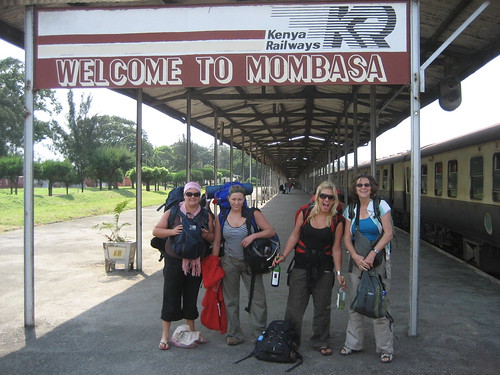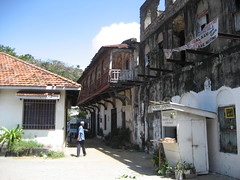Advertisement
Published: September 7th 2006



Buying a ticket on the Nairobi to Mombasa overnight train proved to be an exercise in inefficient African bureaucracy at its best. There were six people mulling about and only one had access to a computer so the rest stood idly watching. It really seemed like no one cared if they sold you a ticket or not. Normally, it would have been a comical observation but our driver was to pick up her boss and we were running late. Finally it all worked out and I purchased a first class ticket because there would only be two in the cabin. They assured me I would share it only with a woman.
The safari company agreed to store some of my stuff so I lightened my pack considerably and left the cart behind. They also sent me to the hotel across the street to book a place with their sister hotel in Mombasa. That was the best move of all as it turned out to be the most popular place in town and was full when I arrived.
There were several travelers waiting at the train station and we shared stories and information. Three girls were from England and were also in first class so we agreed to eat together. Another South African couple gave me some good tips for my upcoming travel there. First class turned out to be a far cry from what you might expect and luckily there was no one else in my cabin which had been my hope. It would do and the dinner was quite good and the girls were fun. They had been working in a Ugandan orphanage and loved the country and the work they were doing. Like me, they did not like Nairobi and were off to spend some time in one of the beach towns along the coast.
The train had made many stops along the 10 hour trip so one more didn’t mean much to me and I saw nothing out my window to indicated we had arrived. Finally I opened my cabin door just as one of the conductors walked by. He laughed and said “Mama, you did not know we have arrived in Mombasa” “We are here.” He got a big kick out of that with his hearty African laugh. I’ve been called “Mama” all over Kenya. I don’t like it because it makes me feel old but I’ve been assured it’s an endearing form of respect. Considering half the population in Kenya is under twenty, it doesn’t take much to be considered old.
By the time I left the train, the girls had negotiated with a taxi driver to take them down the coast to some beach. They dropped me off at my hotel which was a great find with a big street-front veranda where everyone congregated to eat and drink.
It felt better immediately to be in Mombasa. The view from the train had slowly changed from scrub land, thorn trees and acacia to thicker, greener landscapes with banana and papaya trees. The humid air was heavy and tropical. The town is a seedy, sultry port town with white buildings covered in black mold. It’s the moldiest city I’ve ever seen. My hotel was the exception: it was bright and clean like it was painted yesterday.
The language they speak in Kenya is Swahili and everyone uses it with each other. Those who have had an education speak English, although sometimes it’s difficult to understand until your ear is accustomed to the words and the sound. I find that often people have trouble understanding me but are very patient, which is more than I can say of myself. Swahili also refers racially and culturally to the peoples along the African coast who are a mixture of Arabic and African—a result of the Arab trading up and down the African coast a couple hundred years ago—mainly in slaves.
The culture is more Arabic and is expressed in dress, religion and food. They are 65% Muslim in this area and the people look the range from African to Arabic. The Indian population is also very large here. They were brought from India by the British in the 1800’s to build the Mombasa to Uganda railroad. Most stayed and did well in business and are still resented by many. They did not fare well when the country’s gained independence and there are still tensions but things have returned to a more normal state.
The streets narrowed down so that hardly a car could pass and there were a few donkey pulled carts. Eventually I wound my way through some narrow alleyways and into a very busy street market scene. The streets were lined with little shops and people had taken over the sidewalks and most of the street selling their goods. These included produce, many shoes, fabric, underwear and anything useful. This was not a market geared for tourists and over and over I was greeted with “Jambo” (hello). I’d already become used to this and noticed that others are not greeted in the same manner but as a tourist you are the hoped for prize. It was difficult to stop and look at something as each merchant had high hopes of your purchasing and were disappointed if you did not. I was uncomfortable and eventually found my way out of the maize.
My observation is that Africans tend to be somewhat shy, reserved and soft spoken. People are also very conservative in their dress. Woman wear two piece dresses or suits with mid calf skirt lengths. Men wear nice dress shirts and often suits and ties. While Mombasa is slightly more casual, you do not see many people wearing tee shirts and tank tops. Muslim women wear long robes and veils. It varies how much of the face, if any, is covered. Men in Mombasa sometimes wear long white robes.
On the second day, I ventured away from the hotel to see Fort Jesus-- built by the Portuguese on the port entrance. The entrance fee was ridiculous so I found my way around to the back side which had a good vantage point and a view of the port with its exotic dhows and old ships. The old city had some very narrow streets where most of the buildings were dilapidated but signs of the past wealth were evident. They had upper balconies to protect the women from being seen and these were covered in intricate carved wooden fret work. It was very beautiful even in its current state.
It took a while before I was ready to take my first matatu ride. Matatus are colorfully painted vans with five rows of seats, three or four across. They are everywhere and transport the masses all over Africa. Besides the driver, there is a colorful “assistant” who hangs out the sliding door yelling out the destination. His job is to spy potential customers, collect the money and cram as many people as possible into the van. He then hits the roof to signal the driver to go. I had not ridden in one in Nairobi but was willing to give it a go in Mombasa.
My destination was the Nakumat, an African version of Walmart. It was a short distance and I had instructions on which corner to wait at. It took seconds for one to stop. The first thing that hits you is the music—gangster rap or, at the least, reggae. They move quickly and efficiently through the traffic. Safety is another matter and most drivers don’t mess with them. One amusing attribute of each matatu is the owner’s choice of a phrase that they have painted on the back window: things like “Maximum Power”, “Game Aint Over”, “Catch Some Fire”, “Glory 2 Jesus” and my favorite, “Accused 4 Nothing”.
Since the first Nakumat didn’t have what I wanted, I took a couple more matatus to a store ten miles out of town. This involved a change in vehicles and the assistant helped me—all for an incredibly cheap price of 35 cents. The area of the other store was more upscale and the houses became nicer and there was landscaping—lacking in African cities. There were also lots of white people here. Some may have been vacationing in beach towns up the road but some were expats.
Expats are a different breed and I’ve encountered a few around the world. They are often total misfits who drink to excess and would never find acceptance back home. They set themselves up with a young local girl, who is looking to improve her economic condition, and they live “happily ever after”. Now I know this is a gross generality so don’t write and tell me so. There have to be some nice, well adjusted expats out there and some day I may meet one.
The next day I hired a hotel taxi to take me to the airport and a handicraft place where they carved all types of animals, masks and things to sell. You can watch the people making their products. There was so much stuff that I couldn’t choose and decided not to carry the extra weight.
I bought a plane ticket from Mombasa to Zanzibar for the next day.
Advertisement
Tot: 0.174s; Tpl: 0.01s; cc: 10; qc: 49; dbt: 0.0492s; 1; m:domysql w:travelblog (10.17.0.13); sld: 1;
; mem: 1.2mb


